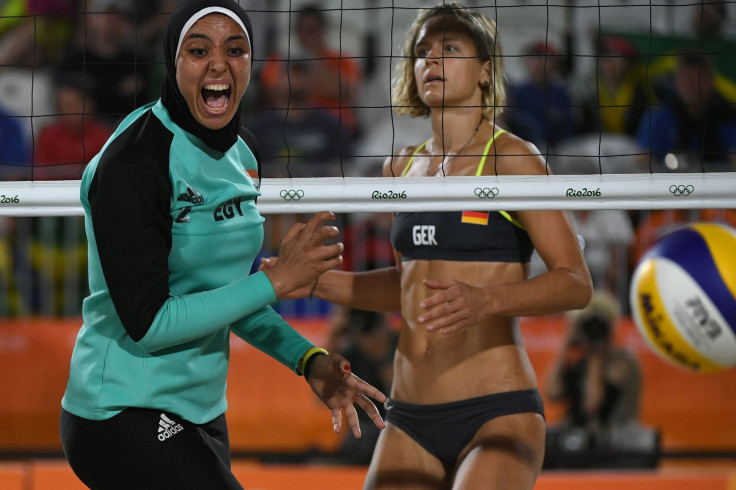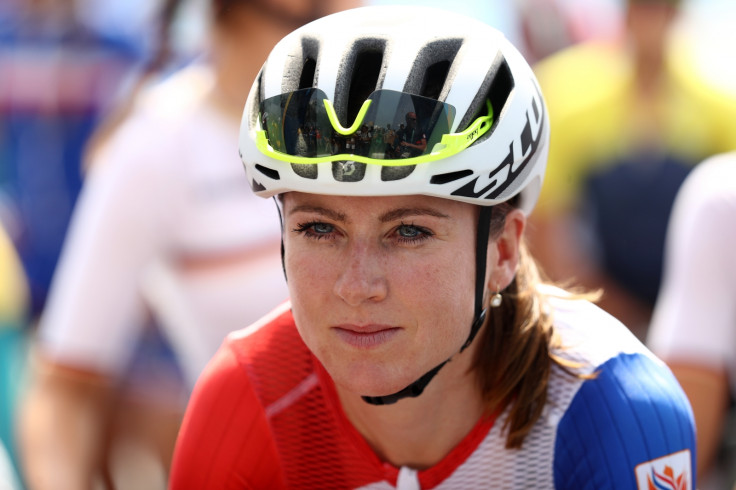Helen Skelton, Annemiek van Vleuten and Doaa El-Ghobashy: controversy or clickbait?
Women's sport given equal billing at the Olympics but some coverage labelled as sexist.
There's a series of striking images from the Germany vs Egypt beach volleyball match at the Olympics, aka "Bikini vs Burqa" thanks to one BBC social media operative who failed to notice the Twitter nightmare they were walking into when posting one of the pictures. The Daily Mail, on the other hand, knew exactly what they were doing when it headlined a story from the Olympic pool: "Never mind about the swimming, check out my #outfitoftheday: BBC presenter Helen Skelton Instagrams her dresses as she swaps into VERY racy orange party number."
Meanwhile, in the search for a local angle, the Chicago Tribune marked Corey Cogdell-Unrein's bronze medal in women's trap shooting thus: "Wife of a Bears' lineman wins a bronze medal today in Rio Olympics". Not surprisingly this coverage has found itself at the epicentre of what is known these days as a Twitter Storm. The easy and obvious cry is "sexism" and that certainly plays its part. But just as much to blame is the clickbait culture.
The beach volleyball picture was an interesting cultural moment to highlight – as much for the positives of global sport bringing together diverse societies – but fell the wrong side of the line between debate and crude cultural comment. "I have worn the hijab for 10 years. It doesn't keep me away from the things I love to do, and beach volleyball is one of them," said Doaa El-Ghobashy. This is a conversation worth having.
As is the unwritten subtext that beach volleyball's fanbase includes some who like watching athletes perform in skimpy outfits. At London 2012 this point was driven home in a most British manner with the theme tune to Benny Hill being played during breaks in play. The men's synchronized divers ensured that it wasn't just the beach volleyball uniforms that caught the eye. Britain's Tom Daley and Daniel Goodfellow claimed bronze medals wearing the teeniest, tiniest swimming briefs, with no clear evidence over why such small outfits were required to be among the best at their sport.
The Mail's Skelton report found its excuse in the faux shock of the Twittersphere. A few random comments – with as much relevance as the mutterings an embarrassing parent would make on the sofa – are used as a justification for stories that people want to read while knowing they are of little real news value.
The length of Skelton's skirt is certainly not reflective of her ability to do her job but is also a topic that many find comment worthy. It would also be naive to believe that the TV presenter isn't aware that her attire brings attention: hence her use of an Instagram feed with, as the newspaper noted, the hashtag: #outfitoftheday.

That someone chose to wear cool clothing in a hot climate should be less noteworthy than the fabulous tales of sporting triumph and disaster happening just yards away. Especially as studio guest Mark Foster was wearing shorts just as small. But as long as people keep clicking on those stories – out of curiosity, interest or outrage – then media organisations will keep telling them. The readers share the guilt with the creators.
The best of the BBC's Olympic presenters have been female: Skelton, Hazel Irvine, Clare Balding. Meanwhile, the women's rugby sevens competition was sport at its best and the choice of commentators, including World Cup winning coach Sir Clive Woodward, reflected that. America's Olympic broadcaster, NBC, justified the tone of it's Rio coverage thus: "The people who watch the Olympics are not particularly sports fans. More women watch the Games than men, and for the women, they're less interested in the result and more interested in the journey."

Sport is about more than the action and who wins or loses. It is enlivened by the narratives behind it. This is especially true at the Olympics, where, the stories are many and various. There are few more dramatic tales than those of the refugees who fled war and persecution to find themselves competing in Rio under a flag to highlight global disaster.
In 20 years time, who will remember the winner of the 2016 women's cycling road race? Millions around the planet will, however, recall the collective wincing as race leader Annemiek van Vleuten crashed out of the race. And as the contrest concluded those viewers were more concerned with her wellbeing than the medal winners; a heartening reminder sports coverage is not destined for the gutter.
© Copyright IBTimes 2025. All rights reserved.





















